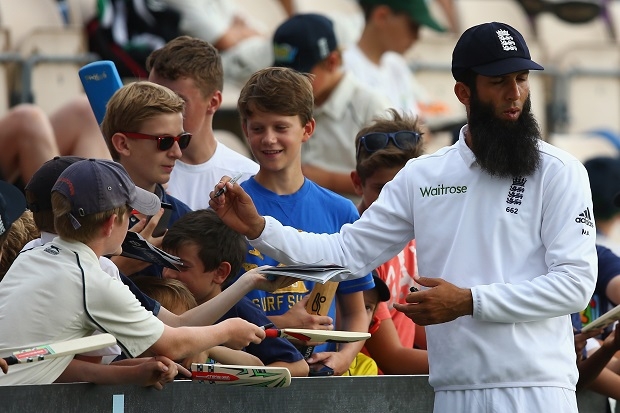Moeen Ali, the England cricketer, faces a possible reprimand after the International Cricket Council (ICC), the game’s governing body, censured him for wearing two wristbands, one saying ‘Save Gaza’, the other ‘Free Palestine’. International cricketers are, you see, prohibited from making political statements on the field.
The English Cricket Board, which is not above making political statements (as its various boycotts of Robert Mugabe’s Zimbabwe suggest), dissents from the ICC’s view, and says that Moeen’s stance is ‘humanitarian not political’.
What, then, of ‘Save Gaza’ and ‘Free Palestine’? There is politics here. And, yes, it is partial. The ECB is disingenuous to suggest that this is a merely ‘humanitarian’ sentiment. But it’s hardly controversial and it definitely isn’t offensive. It does not incite violence or religious hatred. It does not imply violence or religious hatred. It’s in keeping with Moeen Ali’s quiet principles.
Moeen Ali is, very obviously, a devout Muslim. As an England cricketer from the Muslim community, he is attended by the watchwords ‘integration’ and ‘British Muslim’, which have assumed great weight in light of the ‘Trojan Horse’ saga in Moeen’s native Birmingham.
It is to his credit that he ignores the politics around him. He simply bowls his underrated off-spin, and bats with an air of calm (until threatened by the short ball). It goes without saying that if Moeen was a political firebrand, rather than an empathetic, intelligent Muslim, then he probably wouldn’t be playing cricket for England; that sort have other things to be doing this summer.
There are some who say that a cricket pitch is no place even for gentle, humane politics. Sport would make for dull viewing if constantly overridden by politics, especially in the form of overt demonstration. But sometimes a cricket ground is a fine venue for political speech, as when Andy Flower and Henry Olonga took to the field wearing black armbands to mark the ‘death of democracy’ in Zimbabwe. Sometimes a sports pitch is the only place there is to make a clear statement on grave matters.
As I write, a pro-Palestinian protest is underway on Whitehall. It’s loud and strangely threatening to witness. The placards on display are aggressive: ‘Stop Israel’s State Terror’; ‘Judaism Condemns the Zionist Occupation and Siege’. These sentiments do not, I think, aid the cause of peace. They entrench resentment. Their anger confounds empathy. They achieve nothing.
A wristband, by contrast, is a quiet form of political protest – that is it’s only strength. A growling youth bearing a divisive placard is objectionable. A wristband is not.
The Middle East is lamentable, whichever side you take. If the ICC must sanction Moeen, perhaps an enterprising administrator (ho, ho) will insist that he wears a wristband in support of the two state solution and Israel’s right to exist. Then the ICC might ponder whether it needs a policy on inoffensive wristbands at all.






Comments